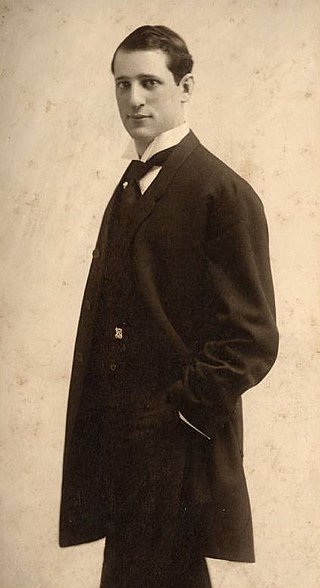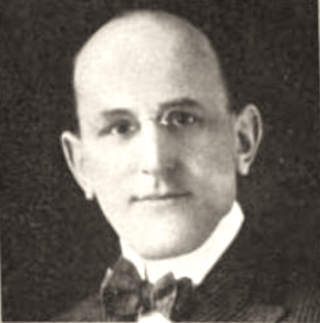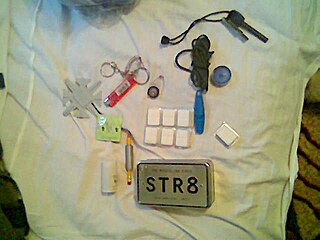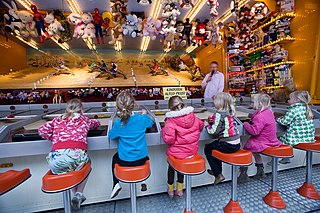Tin Can Alley is an inexpensive electronic shooting game for children. It uses infrared technology embedded inside a small plastic pistol or rifle. The objective is to aim at a mark below a selection of small tin cans perched upon a plastic wall. Successfully aiming at the marks below each of the cans causes the can to "pop off".
The game is based on a popular UK carnival game of the same name, which involves throwing bean bags at tin cans to knock them down. Both the electronic and carnival game are named for Tin Pan Alley, a name for a collection of New York City songwriters and music publishers, as well as the name of the Manhattan location where many of the songwriters and publishers worked.

A frisbee, also called a flying disc or simply a disc, is a gliding toy or sporting item that is generally made of injection-molded plastic and roughly 20 to 25 centimetres in diameter with a pronounced lip. It is used recreationally and competitively for throwing and catching, as in flying disc games. The shape of the disc is an airfoil in cross-section which allows it to fly by reducing the drag and increasing lift as it moves through the air, compared to a flat plate. Spinning the disc imparts a stabilizing gyroscopic force, allowing it to be both aimed with accuracy and thrown for distance.

The tin whistle, also known as the penny whistle, is a simple six-holed woodwind instrument. It is a type of fipple flute, putting it in the same class as the recorder, Native American flute, and other woodwind instruments that meet such criteria. A tin whistle player is called a whistler. The tin whistle is closely associated with Irish traditional music and Celtic music. Other names for the instrument are the flageolet, English flageolet, Scottish penny whistle, tin flageolet, or Irish whistle.

Andy Razaf was an American poet, composer, and lyricist of such well-known songs as "Ain't Misbehavin'" and "Honeysuckle Rose".

Albert Von Tilzer was an American songwriter, the younger brother of fellow songwriter Harry Von Tilzer. He wrote the music to many hit songs, including, most notably, "Take Me Out to the Ball Game".

Fred Fisher was a German-born American songwriter and Tin Pan Alley music publisher.

George Gard "Buddy" DeSylva was an American songwriter, film producer and record executive. He wrote or co-wrote many popular songs, and along with Johnny Mercer and Glenn Wallichs, he co-founded Capitol Records.

Tin Pan Alley was a collection of music publishers and songwriters in New York City that dominated the popular music of the United States in the late 19th and early 20th centuries. Originally, it referred to a specific location on West 28th Street, between Fifth and Sixth Avenues in the Flower District of Manhattan, as commemorated by a plaque on 28th Street between Broadway and Sixth. Several buildings on Tin Pan Alley are protected as New York City designated landmarks, and the section of 28th Street from Fifth to Sixth Avenue is also officially co-named Tin Pan Alley.

Skee-Ball is an arcade game and one of the first redemption games. It is played by rolling a ball up an inclined lane and over a "ball-hop" hump that jumps the ball into bullseye rings. The object of the game is to collect as many points as possible by having the ball fall into holes in the rings which have progressively increasing point values the higher the ring is.

In miniature wargaming, players enact simulated battles using scale models called miniature models, which can be anywhere from 2 to 54 mm in height, to represent warriors, vehicles, artillery, buildings, and terrain. These models are colloquially referred to as miniatures or minis.
James Brockman was an American songwriter. Born in Russia, he emigrated to New York by himself at the age of 9 or 10. His given name was Jacob Brachman but he changed the spelling of the last name because it was mis-pronounced and the rest of the family followed with the change.

A mini survival kit contains essential outdoor survival tools and supplies. It is intended to be carried on one's person at all times, be appropriate to all environments, and be a comprehensive kit without being too large. Mini survival kits are intended to provide the basic needs of a survival situation, self-rescue, assistance or a return to normalcy in optimum situations.

A carnival game is a game of chance or skill that can be seen at a traveling carnival, charity fund raiser, amusement arcade and amusement park, or on a state and county fair midway. They are also commonly played on holidays such as Mardi Gras, Saint Patrick's Day, and Oktoberfest.
Cliff Friend was an accomplished American songwriter and pianist. A member of Tin Pan Alley, Friend co-wrote several hits including "Lovesick Blues", "My Blackbirds Are Bluebirds Now" and "The Merry-Go-Round Broke Down", also known as the theme song to the Looney Tunes cartoon series.
Tin Can Alley may refer to:

Frank Harding (1864-1939) was a Tin Pan Alley music publisher, who was credited with creating the method of selling music called plugging. Harding paid singers to sing his published songs in shops and beer halls to get them known and attract customers. Composers such as Irving Berlin and George Gershwin later got their starts as pluggers. He was active from the 1880s through the 1920s.
Non-redemption is the term used by family fun centers and arcades to indicate that a particular game or attraction does not give out tickets for prizes, as opposed to a redemption game.

Shooting targets are objects in various forms and shapes that are used for pistol, rifle, shotgun and other shooting sports, as well as in darts, target archery, crossbow shooting and other non-firearm related sports. The center is often called the bullseye. Targets can for instance be made of paper, "self healing" rubber or steel. There are also electronic targets that electronically can provide the shooter with precise feedback of the shot placement.

Throwing sports, or throwing games, are physical, human competitions where the outcome is measured by a player's ability to throw an object.

Video is a discontinued American consumer electronics magazine that was published from 1977 to 1999 by Reese Communications with a focus on video and audio devices. The magazine showcases new audiovisual products, analyzes current practices and trends in the field, and provides critical reviews of newly marketed products and equipment. During its early years, it competed fiercely with contemporary journals like Video Review and Video Buyer's Review—ultimately culminating in a 1980 trademark infringement suit over use of the term "Video Buyer's Guide". In March 1995, Video was acquired from Reese by Hachette Filipacchi, and in 1999 it was merged with their bi-monthly Sound & Image magazine to become Sound & Vision.
The Tin Pan South Songwriters Festival is an annual festival of songwriters in Nashville, Tennessee. It was established by the 4,000-member Nashville Songwriters Association International (NSAI) in 1993. The festival is typically a five-day session for songwriters including nights of "songwriter in the round" shows held at 10 or so venues around the city, usually Nashville's top singer/songwriter hotspots. According to Tennessean writer Dave Paulson, the festival allows country music's rising stars to take the stage alongside their closest collaborators. The festival is not about country music per se — it includes all genres of music, and features both professional and amateur composers in the U.S. and abroad. The name was derived from Tin Pan Alley, a district of Manhattan near West 28th Street, where music publishers flourished as far back as 1885. As of 2019, Tin Pan South is "the world's largest songwriter festival" according to the Nashville Convention & Visitors Corporation. The 31st annual (2023) event will feature performances by hundreds of songwriters.